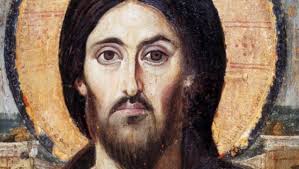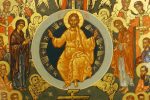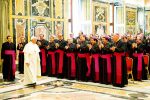The Man-God – Jesus Christ

How many of you have been reading the newspaper on a Saturday morning when the doorbell rings. Answering the door, you discover two very nicely dressed young men with briefcases, Bibles, and copies of the Watchtower Magazine. If you invited them into your home and dialogued with them for any length of time, you probably encountered a heavy dose of what is considered to be the distinguishing tenet of the Jehovah’s Witness religion: Their belief that Jesus Christ is not God. He was God’s first and most perfect creation and God’s agent in creating the universe, but he was not God. And after he became incarnate, he was simply a man.
John 14:28:
You heard me say to you, “I go away, and I will come to you.” If you loved me, you would have rejoiced, because I go to the Father; for the Father is greater than I.
This is one of the most popular verses used by Jehovah’s Witnesses to prove their points. In a dialogue with a Witness, he may well begin his assault on Catholic Christology with this verse. “Catholics claim Jesus is equal with God? Jesus seems to disagree here in John 14:28?”
There are actually two legitimately Catholic and biblical ways of approaching this text. First, we could note that one person being “greater” than another does not necessarily mean he is ontologically or essentially greater than the other like a man is essentially greater than a monkey. Greatness can refer to one person functioning in a greater way quantitatively. Matthew 11:11 tells us there has never “risen among [men] a greater than John the Baptist: yet he that is least in the kingdom of heaven is greater than he.” Because John is “greater” than other humans, is he something more than human?
Likewise, because the text says those in heaven are greater than even John, are they essentially different from John? No, all involved in the text are essentially human. Men may be said to be greater or lesser pertaining to their degree of blessedness. In a similar way, the Father can be said to be “greater” than the Son pertaining to their eternal relation within the inner life of God, but not as to their essence. “Everything that belongs to the Father, except being Father, the Son has also eternally from the Father, from whom he is eternally born …” (CCC para. 246).
A second way of looking at this text is to recognize Jesus is speaking as fully human, or from his human experience. And this makes sense because in the very same verse of John 14:28, Jesus had just said, “You heard me say to you, ‘I go away, and I will come to you…” speaking of his death and resurrection. Thus, it would be entirely appropriate for Christ to say as man, “the Father is greater than [he is],” while as God, he is “equal with God” (cf. Phil. 2:5; John 5:18; John 1:1-3, etc.).
John 17:3
And this is eternal life, that they know thee the only true God, and Jesus Christ whom thou hast sent.
Jesus cannot be God if the Father is “the only true God,” can he?
Well, yes he can.
The fact that Jesus refers to the Father as “the only true God” does not mean Jesus Christ cannot also be “the only true God,” and the Holy Spirit cannot also be “the only true God.” The distinctions between the three persons of the Blessed Trinity are ones of relation, not essence. Each of the three persons is “the only true God.” They are absolutely one in nature.
Thus, Jesus does not deny he is God in John 17:3. He simply refers to his Father “the one true God.” We Catholics certainly believe the Father is God.
John 20:17
Jesus said to [Mary Magdalene], “Do not hold me, for I have not yet ascended to the Father; but go to my brethren and say to them, I am ascending to my Father and your Father, to my God and your God.”
The question is asked: “How can the Father be ‘his God’ if he is God?” The answer is biblically clear. John 1:14 tells us “the Word was made flesh.” God became man! Jesus is both God and man. Here, he speaks as man and as man he is dependent upon the grace of God (see John 1:14-16) in order to fulfill the supernatural end to which his human nature is called (see Luke 2:51-52; Heb. 5:8-9; 2:10-11). He calls the Father his God because he is his God whom Christ worships, prays to, and needs in his fully human nature just as we do.
The Best Defense: A Good Offense
After having answered these which are some of the very best from the Jehovah’s Witness’ arsenal, it is time to go on the offensive. We have demonstrated that we agree that the Father can be said to be “greater” than the Son. We agree that the Father is the one true God, though we say the Son is as well. And we agree that in his humanity, the Son of Man would have the Father as his God. But none of these things deny Christ’s divinity. We then need to show what the Scriptures teach quite plainly. Jesus is God!
John 1:1-3
In the beginning was the Word, the Word was with God, and the Word was God … All things were made by him: and without him was made nothing that was made.
In this text, Jesus (the Word) is called “God” and the creator of all things that were created. Genesis 1:1 says “In the beginning God created …” Jesus is plainly said to be God!
The JW will respond by saying the Greek text actually says “… the Word was a god.” Jesus is a god, not the God because the definite article is not used before god (Gr. “theos”) when referring to Jesus.
There are three main problems with this line of reasoning. 1) In order to distinguish the subject of a given sentence, the predicate nominative in Greek does not take the definite article. The lack of article is grammatically necessary in order to know whether “the Word” or “God” is the subject in this verse. 2) The JW’s are inconsistent. They translate the word theos as Jehovah or “the God” numerous times when it does not have the article when it refers to the Father (See Matthew 5:9, 6:24, Luke 1:35, 2:40, John 1:6, 12,13, 18, Romans 1:7, 17,18 and Titus 1:1, just to name a few). And 3) Jesus is referred to as theos with the definite article many times elsewhere in Scripture. For example:
Hebrews 1:8
But to the Son [the Father] saith, “Thy throne, O God (ho theos, the article + theos) is for ever and ever.”
Jesus is not a god here. He is the God.
Titus 2:13:
Looking for the blessed hope and coming of the glory of the great God and our Savior Jesus Christ (emphasis added).
Not only do we see the definite article before theos, but we see the article + the adjective great. Jesus is not only the God, he is the Great God and our Savior. The Bible is very clear that only Jehovah is both the Great God and our Savior. (See 41:4, 43:3,11, 44:6,8, 45:21, Hos. 13:4, and Luke 1:47.)
John 20:28:
Thomas answered, and said to [Jesus]: My Lord and My God.
The Greek reads the Lord (with definite art.) of me and the God (with definite art.) of me.
I was recently talking with two JW’s about this text and they disagreed with each other. One said, “Thomas said that, not the inspired writer or Jesus.” The implication being, Thomas got a little excited and exaggerated about Jesus. If this were true, it would be blasphemy. Yet, it cannot be because Jesus then blesses Thomas for his belief!
The other Witness said that Thomas referred to Jesus as Lord and then to the Father as God. The problem here is there is no evidence for this in the text. Thomas is directly addressing Jesus.
Revelation 22:6:
And the Lord God (ho kurios ho theos – the Lord the God) of the spirits of the prophets sent his angel to shew his servants the things which must be done shortly.
Who is the Lord God who sent “his angel” in this verse? The JW will say it is Jehovah. Rev. 22:16, just ten verses later, tells us who it is:
I Jesus have sent my angel, to testify to you these things in the Churches.
Jesus is “the Lord God of the spirits of the prophets!”
If you were actually conversing with a couple JW’s and you had presented these texts to them, they would probably be getting a bit ancy by now. My prediction is they would retreat to the safest ground possible. And this could lead in a number of directions, but most likely they would head to one of the most “air-tight” verses (so they think!) demonstrating Catholicism’s errors.
Revelation 3:14:
These things saith the Amen, the faithful and true witness, who is the beginning of the creation of God.
“Jesus is the first created being before all else was created,” they will claim. “Therefore, he is definitely not God.”
Notice, the text does not say he was created. The word translated “beginning” (arche) is used in the book of Revelation to connote “the eternal source of all that is.” In Revelation 1:8, for example, “Almighty God” (Jehovah, according to JW’s) is referred to as “the alpha and omega, the beginning and the end, saith the Lord God, who is, who was, and who is to come, the Almighty.” Do we want to say that Jehovah has a “beginning” because arche (“beginning”) is used to describe Him? “Arche” is here used to mean “the source of all being.”
Thus, Jesus is revealed to be the “source” of the creation of God in Rev. 3:14 because he is the creator of all things. This is confirmed again and again in the New Testament. In John 1:1-3, we are told Jesus (the Word) created “all things … and without him was made nothing that was made.” If he was created, he would have had to create himself which is impossible.
I should warn you at this point: Immediately following Revelation 3:14, Colossians 1:15-17 will normally follow:
Jesus is called the “first-born of every creature. For in him were all things created … he is before all and by him all things consist.”
Jehovah’s witnesses will say this shows Jesus is the first created being because he is “first-born of every creature.” But the problem with their reasoning is that first-born here does not refer to time, but to preeminence. The emphasis is on the fact that he is “before all and by him all things consist.” Even in its Old Testament usage, the title “first-born” is not restricted to a reference to time. The emphasis is on a place of preeminence given by a Father to his son. Isaac, Jacob, and Ephraim received the blessing of the “first-born” though they were not “first-born” in time.
Further, the text does not say Jesus was created. If St. Paul were making this point he would have then said Jesus created all “other” things in verse 16, but he did not. St. Paul says Jesus is the creator of all things. He is God. He is given the title “First-born” by his Father. But this is not in time. He is eternally begotten of the Father.
Share What is Most Clear
The New Testament is very clear as to Christ’s divinity. The few verses that seem to be problematic can be easily cleared up making the way smooth for presenting the abundance of evidence for Christ’s divinity. Below is a small sampling of examples. We will not cite each text, but give you the gist of how each reveal the divinity of Christ.
Luke 12:8-9 – Matthew 13:41
In Luke 12:8-9, angels are called “angels of God” while in Matthew 13:41, they’re called “his [Christ’s] angels.” “God” and “Christ” are synonymous.
Mark 2:5-9
Jesus forgives sins by his own authority. Only Almighty God (“Jehovah”) can forgive sins (See Is. 43:25).
Matt. 25:31-46
Jesus here is depicted as judging the world, yet Scripture reveals only God can do this. Both Genesis 18:25 and Joel 3:12 claim Almighty God is the judge of the world.
John 8:58
Here Jesus refers to himself with the divine name, “I am,” as he also does in John 8:24, 28, 18:5-6 and Mark 14:62. This “I am” formula, not copulative, is a reference back to the Divine Name in Ex. 3:14: “I AM” revealed to Moses as God’s own. Jesus refers to himself as “I am” and the multitudes want to kill him because they know what he is saying (see John 8:59!).
Matthew 5:21-28
In this text, Jesus places his word on the same level as the Old Testament. “You have heard it said (he then quotes Old Covenant texts or beliefs) … but I say to you …” This is in sharp contrast to the prophets who always use a formula such as “the word of the Lord came unto me, saying …” (cf.. Jer. 1:11; Ezek. 1:3). Jesus uses his own authority and establishes the New Covenant. Only God has that kind of authority.
John 5:18 – Phil. 2:6-10
In these texts, Jesus is referred to as “equal” with God by both St. John and St. Paul. In John 5:18, St. John gives us his commentary on why the Jews wanted to kill Jesus: “Because he called God his Father making himself equal with God.”
In Phil. 2:6-10, St. Paul refers to Jesus when he was “in the form of God.” The Greek word for “form” there is morphe, which means the set of characteristics that make a thing what it is. That’s about as close as you get to saying Jesus is God. St. Paul then says Christ’s “equality with God” was not something he clung to; rather, he emptied himself and became man, humbling himself even unto his death on the cross.
In this verse, it appears St. Paul assumes his readers already know Jesus is equal with God, the Father. He says it in passing.
Mark 2:28
In this text, Jesus declares plainly that he is “the Lord of the Sabbath.” The Sabbath is referred to as the “Sabbath of Almighty God” in both the Old and New Testaments (see Exodus 20:10; Isaiah 8:13, which is referred to in I Peter 3:15, and Joel 2:31-32, which is quoted in both Acts 2:20-21, and in Romans 10:13).
Acts 20:28
Take heed to yourselves, and to the whole flock, wherein the Holy Ghost hath placed you bishops, to rule the church of God, which he hath purchased in his own blood.
I had to cite this text so you can see the nuance. Only Jesus can be said to have bled, yet this text says “God” shed his blood. Jesus is God.
The bottom line: The New Testament makes it very clear as to Christ’s full humanity. We can agree with JW’s on this point. However, the Scriptures are equally clear as to Christ’s divinity. The choice is ours. Will we choose to believe that Jesus is Almighty God manifest in the flesh as Scripture reveals, or will we choose the alternative, which according to Jesus is “[to] die in [our] sins.” Jesus said, “Unless you believe I AM, you shall die in your sins” (John 8:24).
If you enjoyed this and you want more information on this topic and more, click here.






